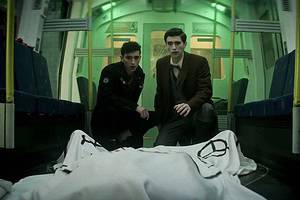For many of us, music is a way of life. For Rudy Mancuso, music is his life, and not in the figurative sense. Born with synesthesia, a rare condition that mixes your senses, Rudy walks through his everyday life turning simple sounds – fingers tapping, shoes walking on pavement, even the clink of a glass – into complex rhythms and soaring music. Though his condition channels into his passions, it can also be debilitating, especially when trying to find direction as a puppeteer and composer, living with his overbearing mother, and maintaining his relationship with his girlfriend, Haley (Francesca Reale).
Regardless, he takes things one day at a time, often gliding on his love for the music. Audiences, too, will likely glide on the musical storytelling of Música, the aptly titled directorial debut of online sensation Rudy Mancuso that tells a story biographical to a fault. The film’s opening title states the film is “based on a true story, unfortunately.” Much of Música comes from Mancuso’s own life story; he is ostensibly playing himself as is his real-life mother, Maria Mancuso, as his on-screen mother. The film is set and was shot in Newark, New Jersey, Mancuso’s hometown, and the movie makes use of Mancuso’s puppet persona, Diego, also voiced by Mancuso. The film’s synesthetic draw comes from Mancuso’s real-life condition and all of the film’s music is credited to Mancuso.

The aforementioned unfortunately is in regards to the film’s romance; after unexpectedly breaking up with Haley, Rudy meets Isabella (Camila Mendes, whom Mancuso began dating during production), a Brazilian woman working at a local fish market. They hit it off immediately, as Isabella’s cultural roots speak to Rudy far more than Haley’s conventional millennial aspirations and concealed white privilege. However, just as things are going well with Isabella, Haley wants to try again. Rudy can’t decide between the two, and antics ensue.
Despite its title, Música is not a musical, though it is musical. Mancuso uses the power of visual storytelling to translate his synesthesia into expertly choreographed, gorgeously composed dance breaks from within environments of everyday life: a diner, a local park, the subway. Simple activities and movements become modes of expression, and it’s enthralling to witness from the very first scene. There are other tiny touches – one scene sees Mancuso interacting with a restaurant piano player across the room using nothing but percussive tapping and musical notes, all of which are accompanied by captions – that make for a film eager to use music as its own character in the narrative.

However, the broad strokes of the storytelling do not utilize music, which is where the film’s unique conceit begins to feel more like a gimmick. It’s surprising Mancuso chooses not to incorporate musical numbers (three brief sing-a-longs with a subway busker notwithstanding) considering his film totes music as an essential feature. He is the only character who expresses himself through music, which is surely intentional in portraying his condition. However, the lack of musical connection within the ensemble forces the drama to play out in conventional terms. Put next to Mancuso’s elaborate choreography, it feels like something potent is missing.
Thankfully, Mancuso and Mendes’ charm and chemistry are just enough to fill in most of the gaps. The two feel like fully realized characters, navigating personal challenges that feel unique amidst their cultural expectations. Maria Mancuso is a beautiful addition to the film’s ensemble, bringing a natural camera presence to a first-time role but still clearly mirroring reality as Rudy’s mother. Another highlight is Diego, who is given new life as a hilarious voice of reason for Mancuso as opposed to simply a comedic mouthpiece. Reale is solid in her role as well, while J. B. Smoove provides comic relief in a relatively underutilized supporting turn.

Though the film meanders toward its final act, it does eventually land on a compelling conclusion to its otherwise pedestrian drama that doesn’t cater to its heartwarming, feel-good instincts. It’s far from a tragedy, but it’s a testament to Mancuso’s ability to look inward. Mancuso’s portrayal of his story doesn’t sand off its edges and provides a sobering take on living life with a rare sensory condition. It’s this, along with overall strong production value, that elevates Música beyond standard streaming fare and worthy of breaking through the weekly choice paralysis fodder. It still feels like Mancuso has room to up his directorial game, but it’s impossible to say he hasn’t already come into his own. After all, this story can only be his own.
Música is now streaming exclusively on Prime Video.
Mancuso’s deeply personal story lacks some punch in its musical storytelling, but makes up for it thanks to breathtaking dance numbers, a strong ensemble of actors, and unflinchingly personal insight.
-
GVN Rating 7
-
User Ratings (0 Votes)
0

Larry Fried is a filmmaker, writer, and podcaster based in New Jersey. He is the host and creator of the podcast “My Favorite Movie is…,” a podcast dedicated to helping filmmakers make somebody’s next favorite movie. He is also the Visual Content Manager for Special Olympics New Jersey, an organization dedicated to competition and training opportunities for athletes with intellectual disabilities across the Garden State.







